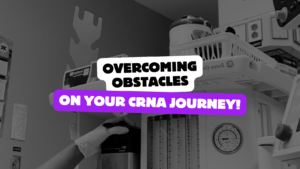“I once thought if I got an interview and was accepted to CRNA school everything else would be fine.”
Wrong! Of course with the benefit of hindsight this is really easy to say, but looking back on those years I realized how naive I was to think that. Therefore, I felt I needed to focus on this topic today because getting into nurse anesthesia school is only half the battle. Staying in the program and completing it is a whole other ballgame.
Of course everyone’s experience leading up to CRNA school will be different, but here I have listed what I wish I knew before CRNA school:
Took my science courses more seriously
During all my undergraduate studies, I was just a quick learner. I didn’t study much but I always managed to get good grades. Of course, I wasn’t thinking about going back to school to be a CRNA either. Honestly, I always just looked forward to passing the class, graduating and moving on. Once I graduated, I would always say I am not going back to school, I am done.
But of course, life happens and you realize your purpose. And that may require you to go back to school. At least this was my case. Once I started CRNA school I quickly realized I should have taken those science courses more seriously from the start. Having this foundation gives you the framework as you begin to take more advanced science courses. And possessing the framework will help you gradually deepen your understanding of the material.
Coming into a CRNA program as an experienced critical care nurse with a bachelor’s degree in nursing or related field, you are expected to already possess some basic knowledge, skills and concepts. To be successful in advanced science courses, you must have a sufficient knowledge base which includes concepts in addition to learning new material. To be successful, this knowledge must then be retained and carried over into clinical practice.
Learned how to handle criticism
Nurse anesthesia school is tough, especially in the clinical setting. One of the reasons for this in clinicals is you come from a critical care unit where you know everything, but once you start clinicals you are back to being a novice. So, right now is the time to develop thick skin. And one of the ways to do this is by thinking of the bigger picture.
For instance, Always ask, ‘What can I learn from this situation? How can I do things differently next time? Or maybe, speak further with the person to see how you can do things better. If you can learn from the feedback and do it better next time, you will always bounce back and be more resilient. This is what makes a great CRNA also.
So, instead of taking negative feedback personally, ask yourself what you can learn from the situation. Also, don’t take everything as a personal insult. Trust me, you can learn from either a bad situation or a good one. Also stop assuming everything is about you. It could be the other person is having a bad day or going through something in their life.
There is no right path
Some prospective applicants believe their path to become a CRNA should be laid out like a blueprint. I will go to ICU and work a few years, apply to CRNA school and get accepted after the 1st interview. Then finish CRNA school in a few years and everything will be rosy.
But I believe there is no such thing as a true blueprint or right path to CRNA school. I recently presented a plan to a reader on what she needed to do to become a CRNA. She asked me if it was possible since she is in her mid 30’s. I actually laughed because I was 39 when I entered my program. And I was around the 4th oldest in my class. I believe the oldest person in his early 50’s.
The makeup of my class looked different, that is the beauty of it. Nursing for most of us was the 2nd and 3rd careers for some. Each person will have their own unique story. It is filled with ups and downs. So don’t go into your CRNA journey thinking I don’t look like the other candidates or the student sitting beside you. Who cares? Just keep reminding yourself you are meant to be where you are and on your own path.
Figured out how to study early on
NA school is rigorous and extremely more difficult than undergraduate courses. Therefore, it requires a different set of studying skills. I personally know straight A undergraduate students who rarely studied then actually struggled to finish CRNA school.
Every person has a different style of learning and by discovering and understanding your own learning style early, this can set you up for success while in CRNA school. Use your time now to research and figure out how you learn best. There are a ton of resources online, at your local library or even at your college.
One of the most widely accepted learning models is called the VARK model. The acronym VARK stands for visual, auditory, reading/ writing, and kinesthetic modalities used to learn information. Look up more on this model because you don’t want to be sitting in your advanced pathophysiology class and realize you have no idea how to learn the material. And on top of having to learn the material you also need to learn how to study. Unfortunately, it may be too late then due to the volume of information coming at you like water from a firehouse. Again, get on top of this now so you can be successful and less stressed in your program.
Essential tips
Receiving my acceptance letter to CRNA school was awesome, but I quickly realized there were some things I didn’t think think through which would of helped me while in school. Start thinking about how you can get ahead now, so when you do start CRNA school you will not experience the heartache I did in the beginning. Hopefully, these tips will help you on your CRNA journey. What are some things you can think of now to get a leg up on CRNA school?







